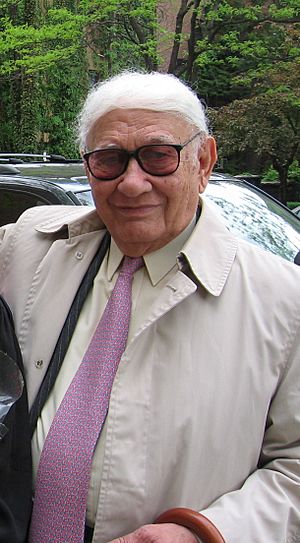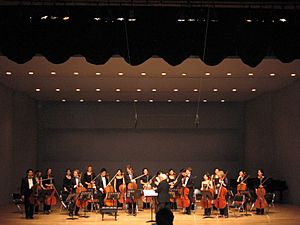Aldo Parisot facts for kids
Quick facts for kids
Aldo Parisot
|
|
|---|---|

Aldo Parisot, New Haven, May 2005
|
|
| Background information | |
| Birth name | Aldo Simoes Parisot |
| Born | September 30, 1918 Natal, Brazil |
| Died | December 29, 2018 (aged 100) Guilford, Connecticut |
| Genres | Classical |
| Occupation(s) | Cellist, Cello teacher |
| Instruments | Cello |
| Years active | fl. ca. 1946–2018 |
| Labels | Albany Records, Naxos Records, Delos International |
| Associated acts | Yale Cellos |
Aldo Simoes Parisot (born September 30, 1918 – died December 29, 2018) was a famous cellist and cello teacher. He was born in Brazil and later became an American citizen. He taught music at the Yale School of Music for 60 years. This made him the longest-serving teacher at that school.
Contents
Early Life and Cello Training
Aldo Parisot was born in Natal, Brazil. He started learning the cello at age seven. His stepfather, Tomazzo Babini, was his first teacher. Babini taught him to play without unnecessary tension. This was a key lesson for his whole career.
At 12, Aldo Parisot played his first professional concert. He then became the main cellist for the Brazilian Symphony Orchestra. During one concert, an American diplomat named Carleton Sprague Smith heard him play. Smith was very impressed. He invited Parisot to meet the famous violinist Yehudi Menuhin.
Smith later offered Parisot a chance to study in the United States. He suggested the Curtis Institute of Music. Parisot wanted to study with a famous cellist named Emanuel Feuermann. Sadly, Feuermann died before Parisot could arrive in the US.
Later, Smith offered Parisot a scholarship to Yale University. Parisot would study music theory and chamber music there. He started at Yale in 1946 as a "special student." His theory teacher was Paul Hindemith, a well-known composer. They became good friends.
Becoming a Solo Star
When he was 26, Aldo Parisot made his first big performance in the United States. He played with the Boston Symphony Orchestra. This was at the Tanglewood Music Festival. The next year, he toured Europe.
After finishing his studies at the Yale School of Music, he toured widely. He played concerts across the United States, Canada, and South America. Experts said Parisot was a brilliant solo player. He was also a great chamber musician and teacher.
In the 1950s, Parisot played many solo concerts. He also performed with many orchestras. He often played new music written by composers like Heitor Villa-Lobos. Many pieces were even written just for him. People admired his musical talent and amazing playing.
Heitor Villa-Lobos wrote his Cello Concerto No. 2 for Parisot. Parisot played it for the first time with the New York Philharmonic. He played with famous conductors like Leopold Stokowski and Leonard Bernstein. He also played with orchestras in cities like Berlin, London, and Paris.
From 1956 to 1996, Parisot owned a very special cello. It was called the De Munck Stradivarius. This cello was made by the famous craftsman Antonio Stradivari.
A Renowned Teacher
Aldo Parisot was very famous for his teaching. He taught at several top music schools. These included the Juilliard School and the Peabody Conservatory. In 1958, he started teaching at Yale.
Many of his students became successful musicians. They became concert artists, teachers, and players in major orchestras. Some well-known students include Ralph Kirshbaum and Han-na Chang. One student said Parisot helped him use his musical imagination.
From 1983, Parisot also led the Yale Cellos. This was a group of his current students. The group released several award-winning CDs. One even got a nomination for a Grammy Award. Parisot retired from Yale in July 2018. He was the oldest and longest-serving teacher there.
Master Classes Around the World
Aldo Parisot often gave special lessons called master classes. In these classes, he would teach advanced students in front of an audience. He taught at the Banff Centre for many years. He also taught at the Yale Summer School.
In 1984, Parisot taught master classes in China. He went back the next year. He also taught and performed in Israel at the Jerusalem Music Center. He gave classes in South Korea and Finland. He even taught at the Manchester International Cello Festival in England. In 2000, he toured Taiwan to help raise money for earthquake victims.
Judging Music Competitions
Parisot was often asked to be a judge for important music competitions. He served on juries in many countries. These included Germany, France, Chile, and Brazil. In 1991, he was a judge at the first Paulo International Cello Competition in Finland. He also regularly judged the Carlos Prieto International Cello Competition in Mexico.
In 2007, he was the head judge at the first Aldo Parisot International Competition. This competition was held in South Korea. In 2008, he judged the first International Krzysztof Penderecki Cello Competition in Poland.
Hidden Talent: Painting
Aldo Parisot was also a talented painter. He showed his artwork in galleries in cities like Boston, New Haven, and Palm Beach. He also had exhibitions in Poland. He gave all the money from his painting sales to a special fund. This fund, now called the "Cello Enrichment Fund," helps cello students.
Personal Life
Aldo Parisot was married twice. With his first wife, Ellen Lewis, he had three sons. One of his sons, Aldo L. "Dean" Parisot, became a film director. His second marriage was to pianist Elizabeth Sawyer Parisot. They were married for 52 years. Aldo Parisot passed away at his home in Guilford, Connecticut, in 2018. He was 100 years old.
Awards and Honors
Aldo Parisot received many awards and honors throughout his life. He earned gold medals and became an honorary citizen of countries like Lebanon and Brazil.
- In 1980, he received the Eva Janzer "Chevalier du Violoncelle" award.
- In 1982, he was given the United Nations Peace Medal.
- In 1983, he won the Artist/Teacher Award.
- In 1994, he was named the Samuel Sanford Professor of Music at Yale.
- In 1997, he received the Governor's Arts Award from Connecticut.
- In 1999, he received an honorary Doctorate of Music.
- In 2001, he got the Award of Distinction from the Royal Northern College of Music.
- In 2002, he received the Gustave Stoeckel Award.
- Also in 2002, he was honored with an honorary Doctor of Fine Arts degree from Penn State University.
 | Jewel Prestage |
 | Ella Baker |
 | Fannie Lou Hamer |


